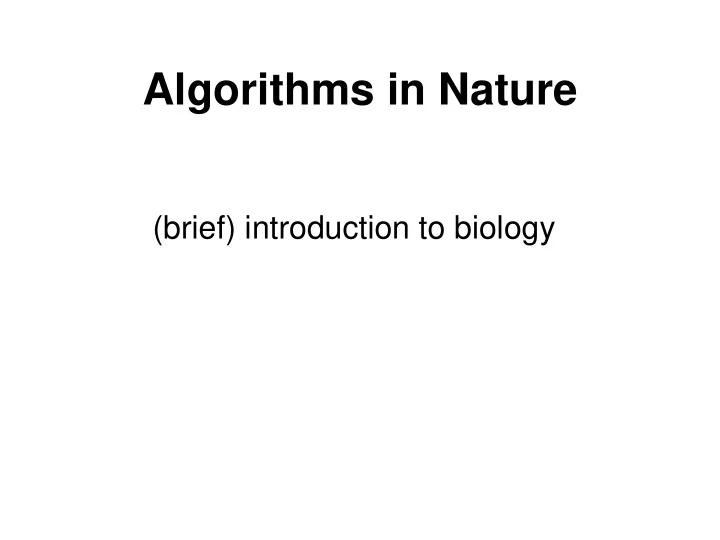

Algorithms in Nature (brief) introduction to biology
Organism, Organ, Cell Organism 2
Types of Cells • Eukaryots: - Plants, animals, humans - DNA resides in the nucleus - Contain also other compartments • Prokaryots: - Bacteria - Do not contain compartments
Cell signaling • Cells communication is based on chemical signals & receptors – If you have the correct receptor, respond to signal; no receptor = no response – Single-celled organisms receive cues about the environment, status of other individuals • Process termed the signal transduction pathway – From signal interacting with receptor to cellular response
Types of Signals • Local signaling: short-distance – affect the cells that produce them – affect nearby cells (diffuse) • Hormonal signaling: long-distance – Typically found in multicellular organisms & use circulatory system for distribution
Cell Signaling Stages 1. Reception : signal molecule interacts with receptor 2. Transduction typically several steps that involve changes to responder molecules and downstream targets 3. Outcome: often triggers a cellular response ( effect )
Introduction to Molecular Biology • Genomes • Genes • Regulation • mRNAs • Proteins • Systems
Central dogma CCTGAGCCAACTATTGATGAA DNA transcription mRNA CCUGAGCCAACUAUUGAUGAA translation Protein PEPTIDE
Genome • A genome is an organism’s complete set of DNA (including its genes). • However, in humans less than 3% of the genome actually encodes for genes. • … while a much larger % of the genome is transcribed (miRNAs, lincRNAs, …) • A part of the rest of the genome serves as a control regions (though that’s also a small part).
Comparison of Different Organisms Genome size Num. of genes .05*10 8 E. coli 4,200 .15*10 8 Yeast 6,000 1*10 8 Worm 18,400 1.8*10 8 Fly 13,600 30*10 8 Human 25,000 1.3*10 8 Plant 25,000
Biological data is rapidly accumulating Transcription factors Next generation sequencing DNA transcription RNA translation Proteins
Genes
What is a gene? Promoter Protein coding sequence Terminator Genomic DNA
Example of a Gene: Gal4 DNA ATGAAGCTACTGTCTTCTATCGAACAAGCATGCGATATTTGCCGACTTAAAAAGCTCAAG TGCTCCAAAGAAAAACCGAAGTGCGCCAAGTGTCTGAAGAACAACTGGGAGTGTCGCTAC TCTCCCAAAACCAAAAGGTCTCCGCTGACTAGGGCACATCTGACAGAAGTGGAATCAAGG CTAGAAAGACTGGAACAGCTATTTCTACTGATTTTTCCTCGAGAAGACCTTGACATGATT TTGAAAATGGATTCTTTACAGGATATAAAAGCATTGTTAACAGGATTATTTGTACAAGAT AATGTGAATAAAGATGCCGTCACAGATAGATTGGCTTCAGTGGAGACTGATATGCCTCTA ACATTGAGACAGCATAGAATAAGTGCGACATCATCATCGGAAGAGAGTAGTAACAAAGGT CAAAGACAGTTGACTGTATCGATTGACTCGGCAGCTCATCATGATAACTCCACAATTCCG TTGGATTTTATGCCCAGGGATGCTCTTCATGGATTTGATTGGTCTGAAGAGGATGACATG TCGGATGGCTTGCCCTTCCTGAAAACGGACCCCAACAATAATGGGTTCTTTGGCGACGGT TCTCTCTTATGTATTCTTCGATCTATTGGCTTTAAACCGGAAAATTACACGAACTCTAAC GTTAACAGGCTCCCGACCATGATTACGGATAGATACACGTTGGCTTCTAGATCCACAACA TCCCGTTTACTTCAAAGTTATCTCAATAATTTTCACCCCTACTGCCCTATCGTGCACTCA CCGACGCTAATGATGTTGTATAATAACCAGATTGAAATCGCGTCGAAGGATCAATGGCAA ATCCTTTTTAACTGCATATTAGCCATTGGAGCCTGGTGTATAGAGGGGGAATCTACTGAT ATAGATGTTTTTTACTATCAAAATGCTAAATCTCATTTGACGAGCAAGGTCTTCGAGTCA
Genes Encode for Proteins
Example of a Gene: Gal4 AA MKLLSSIEQACDICRLKKLKCSKEKPKCAKCLKNNWECRYSPKTKRSPLTRAHLTEVESR LERLEQLFLLIFPREDLDMILKMDSLQDIKALLTGLFVQDNVNKDAVTDRLASVETDMPL TLRQHRISATSSSEESSNKGQRQLTVSIDSAAHHDNSTIPLDFMPRDALHGFDWSEEDDM SDGLPFLKTDPNNNGFFGDGSLLCILRSIGFKPENYTNSNVNRLPTMITDRYTLASRSTT SRLLQSYLNNFHPYCPIVHSPTLMMLYNNQIEIASKDQWQILFNCILAIGAWCIEGESTD IDVFYYQNAKSHLTSKVFESGSIILVTALHLLSRYTQWRQKTNTSYNFHSFSIRMAISLG LNRDLPSSFSDSSILEQRRRIWWSVYSWEIQLSLLYGRSIQLSQNTISFPSSVDDVQRTT TGPTIYHGIIETARLLQVFTKIYELDKTVTAEKSPICAKKCLMICNEIEEVSRQAPKFLQ MDISTTALTNLLKEHPWLSFTRFELKWKQLSLIIYVLRDFFTNFTQKKSQLEQDQNDHQS YEVKRCSIMLSDAAQRTVMSVSSYMDNHNVTPYFAWNCSYYLFNAVLVPIKTLLSNSKSN AENNETAQLLQQINTVLMLLKKLATFKIQTCEKYIQVLEEVCAPFLLSQCAIPLPHISYN NSNGSAIKNIVGSATIAQYPTLPEENVNNISVKYVSPGSVGPSPVPLKSGASFSDLVKLL SNRPPSRNSPVTIPRSTPSHRSVTPFLGQQQQLQSLVPLTPSALFGGANFNQSGNIADSS
Structure of Genes in Mammalian Cells • Within coding DNA genes there can be un-translated regions (Introns) • Exons are segments of DNA that contain the gene’s information coding for a protein • Need to cut Introns out of RNA and splice together Exons before protein can be made • Alternative splicing increases the potential number of different proteins, allowing the generation of millions of proteins from a small number of genes.
Comparative genomics
Regulatory Regions
Promoter The promoter is the place where RNA polymerase binds to start transcription. This is what determines which strand is the coding strand.
DNA Binding Motifs • In order to recruit the transcriptional machinery, a transcription factor (TF) needs to bind the DNA in front of the gene. • TFs bind in to short segments which are known as DNA binding motifs. • Usually consists 6 – 8 letters, and in many cases these letters generate palindromes.
Example of Motifs
Messenger RNAs (mRNAs)
RNA Four major types (one recently discovered regulatory RNA). • mRNA – messenger RNA • tRNA – Transfer RNA • rRNA – ribosomal RNA • RNAi, microRNA – RNA interference
Messenger RNA • Basically, an intermediate product • Transcribed from the genome and translated into protein • Number of copies correlates well with number of proteins for the gene. • Unlike DNA, the amount of messenger RNA (as well as the number of proteins) differs between different cell types and under different conditions.
Complementary base-pairing • mRNA is transcribed from the DNA • mRNA (like DNA, but unlike proteins) binds to its complement Transcription apparatus mRNA Gene RNAPII TFIIH Activators AUGC hybridization label mRNA UACG
Perturbation • In many cases we would like to perturb the systems to study the impacts of individual components (genes). • This can be done in the sequence level by removing (knocking out) the gene of interest. • Not always possible: - higher organisms - genes that are required during development but not later - genes that are required in certain cell types but not in others
Proteins
From RNA to proteins: The Ribosome • Decoding machine. • Input: mRNA, output: protein • Built from a large number of proteins and a number of RNAs. • Several ribosomes can work on one mRNA
The Ribosome
Proteins • Proteins are polypeptide chains of amino acids. • Four levels of structure: - Primary Structure: The sequence of the protein - Secondary structure: Local structure in regions of the chain - Tertiary Structure: Three dimensional structure - Quaternary Structure: multiple subunits
Secondary Structure: Alpha Helix
Protein Structure
Protein Interaction In order to fulfill their function, proteins interact with other proteins in a number of ways including: • Regulation • Pathways, for example A -> B -> C • Post translational modifications • Forming protein complexes
Putting it all together: Systems biology
High throughput data • We now have many sources of data, each providing a different view on the activity in the cell - Sequence (genes) - DNA motifs - Gene expression - Protein interactions - Image data - Protein-DNA interaction - Etc.
High throughput data • We now have many sources of data, each providing a different view on the activity in the cell - Sequence (genes) - DNA motifs How to combine these different data types together to - Gene expression obtain a unified view of the activity in the cell is one of the - Protein interactions major challenges of systems biology - Image data - Protein-DNA interaction - Etc.
Recommend
More recommend